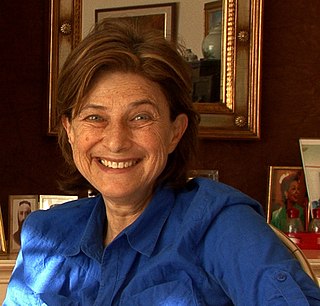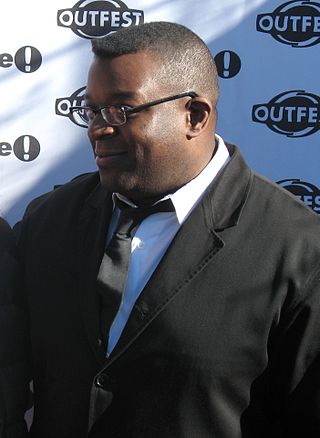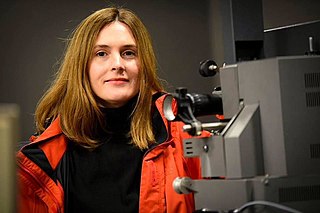External links
- Lis Rhodes at IMDb
Lis Rhodes | |
|---|---|
| Born | 1942 (age 81–82) Cornwall, England |
| Education | North East London Polytechnic Royal College of Art |
| Known for | Film and visual art |
Lis Rhodes (born 1942) is a British artist and feminist filmmaker, known for her density, concentration, and poeticism in her visual works. She has been active in the UK since the early 1970s.
Rhodes was brought up in West England, was educated at North East London Polytechnic, [1] and studied Film and Television at the Royal College of Art. [2]
Since the early 1970s, Rhodes has created radical and controversial art that challenges her viewers to question perspective of film through her work. She wanted her audience to "reconsider film as a medium of communication and presentation of image, language and sound." [3]
She was cinema curator at the London Film-Makers' Co-op from 1975 to 1976. [1] In 1979, Rhodes co-founded the feminist film distribution network, Circles. [1] She was a member of the exhibition committee for the 1979 Arts Council Film on Film event, and international retrospective of avant-garde cinema. [2] Rhodes was Arts Advisor to the Greater London Council from 1982 to 1985, [1] and since 1978 has lectured part-time at the Slade School of Fine Art, University College London.
One key innovative piece Rhodes created is Light Music (1975), which was exhibited at the Tate Modern from July 2012 – January 2013. Tate deemed it, "An iconic work of expanded cinema that created a more central and participatory role for the viewer within a dynamic, immersive environment". [4] Her work was also included in the 2007 exhibition WACK! Art and the Feminist Revolution . [5]
In 2012, Rhodes' solo exhibition, Dissonance and Disturbance was held at the Institute of Contemporary Arts, London. [5] The ICA noted that Rhodes "examines the relationships in her work - from film, composition and writing - to the notation of sound and image, and the language of political dissent." [3]
According to Rhodes, "The view through the lens may be blurred or defined – focused or unfocusfocused or unfocused – depending on what you think you know; what you imagine you see; what you learn to look for: what you are told is visible". [3] Rhodes does not view her art as an isolated practice, but rather as a social function. [2] She lives and works in London. [1]
Rhodes won the Freelands Award in 2017. [6] In 2018, Rhodes' work was included in the Courtisane Film Festival in Ghent, Belgium as part of a focus on women filmmakers that curators, Mónica Savirón and María Palacios Cruz, felt have been overlooked. [7] In October 2022, a group of artists plan to present Liquid Architecture x Light at the ACMI's Gallery 3 inspired by Rhode's 1975 Light Music [8] [9] in conjunction with the exhibit, Light: Works from Tate’s Collection, being held at Melbourne's ACMI. [10]

Chantal Anne Akerman was a Belgian film director, screenwriter, artist, and film professor at the City College of New York.
Eija-Liisa Ahtila is a contemporary visual artist and filmmaker who lives and works in Helsinki.

Sir Isaac Julien is a British installation artist, filmmaker, and Distinguished Professor of the Arts at the University of California, Santa Cruz.

Barbara Jean Hammer was an American feminist film director, producer, writer, and cinematographer. She is known for being one of the pioneers of the lesbian film genre, and her career spanned over 50 years. Hammer is known for having created experimental films dealing with women's issues such as gender roles, lesbian relationships, coping with aging, and family life. She resided in New York City and Kerhonkson, New York, and taught each summer at the European Graduate School.
Vivienne Dick is an Irish feminist experimental and documentary filmmaker. Her early films helped define the No Wave scene. According to The Irish Times, Dick is "one of the most important film-makers Ireland has produced".
ACMI, formerly the Australian Centre for the Moving Image, is Australia's national museum of screen culture including film, television, videogames, digital culture and art. ACMI was established in 2002 and is based at Federation Square in Melbourne, Victoria.

Alexis Jan Atthill Hunter was a New Zealand painter and photographer, who used feminist theory in her work. She lived and worked in London UK, and Beaurainville France. Hunter was also a member of the Stuckism collective. Her archive and artistic legacy is now administered by the Alexis Hunter Trust.
Philippe Parreno is a French contemporary artist, living and working in Paris. His works include films, installations, performances, drawings, and text.
Olivia Plender is an artist based in London and Stockholm. She is known for her installations, performances, videos, and comics.
Mark Leckey is a British contemporary artist. His found object art and video pieces, which incorporate themes of nostalgia and anxiety, and draw on elements of pop culture, span several works and exhibitions. In particular, he is known for Fiorucci Made Me Hardcore (1999) and Industrial Light and Magic (2008), for which he won the 2008 Turner Prize.

Mania Akbari is an Iranian filmmaker, artist, writer, and curator whose works explore women's rights, marriage, sexual identity, disease and body image. Her style, in contrast to the long tradition of melodrama in Iranian cinema, is rooted in the visual arts and autobiography. Because of the taboo themes frankly discussed in her films and her opposition to censorship, she is considered one of the most controversial filmmakers in Iran.

Sandra Lahire was a central figure in the experimental feminist filmmaking that emerged in the UK in the 1970s and 1980s.
Tessa Hughes-Freeland is a British-born experimental film maker, writer living in New York City. Her films have screened internationally in North America, Europe and Australia and in prominent museums and galleries, including the Museum of Modern Art (MOMA); the Museum of Contemporary Art, Los Angeles; the Whitney Museum of American Art; the New Museum of Contemporary Art in New York; and the KW Institute of Contemporary Art in Berlin. She has collaborated on live multi-media projects with musicians like John Zorn and J. G. Thirlwell. She and Ela Troyano co-founded the New York Film Festival Downtown in 1984 and served as its co-directors until 1990. Hughes-Freeland later served as President of the Board of Directors of the Film-Makers Co-Operative in New York City from 1998-2001. She has published articles in numerous books, including “Naked Lens: Beat Cinema” and “No Focus: Punk Film,” and in periodicals including PAPER Magazine, Filmmaker magazine, GQ, the East Village Eye, and Film Threat.
Sarah Pucill is a London-based film artist. Her work is distributed by LUX, London and LightCone, Paris. She is a Reader at University of Westminster. Central to her work is "a concern with mortality and the materiality of the filmmaking process". Much of her work appears within the restrictions of domestic spaces. In her "explorations of the animate and inanimate, her work probes a journey between mirror and surface".
Wu Tsang is a filmmaker, artist and performer based in New York and Berlin, whose work is concerned with hidden histories, marginalized narratives, and the act of performing itself. In 2018, Tsang received a MacArthur "genius" grant.
Electra is a London-based non-profit arts organisation that commissions new work by artists working across sound art, moving image, performance and visual art. The organisation particularly works with feminist concerns and overlooked histories. One of its earliest projects, Her Noise, has an archive, the Her Noise Archive, that is housed by University of the Arts, London Archives and Special Collections at London College of Communication, and has an online resource hernoise.org.
Sarah Turner is a British artist, filmmaker, writer, curator and academic. Her moving image work is known for its preoccupation with form and its interplay between abstraction and narration.

Heather Phillipson is a British artist working in a variety of media including video, sculpture, electronic music, large-scale installations, online works, text and drawing. She was nominated for the Turner Prize in 2022. Her work has been presented at major venues internationally and she has received multiple awards for her artwork, videos and poetry, including the Film London Jarman Award in 2016. She is also an acclaimed poet whose writing has appeared widely online, in print and broadcast.

Laida Lertxundi is a Spanish artist, filmmaker and professor of fine arts based in the United States and the Basque Country.
Jenn Nkiru is a Nigerian-British artist and director. She is known for directing the music video for Beyoncé's "Brown Skin Girl" and for being the second unit director of Ricky Saiz’s video for Beyoncé and Jay-Z, "APESHIT" which was released in 2018. She was selected to participate in the 2019 Whitney Biennial.